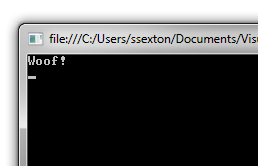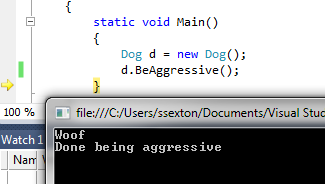#638 – Defining and Using a Partial struct
July 31, 2012 Leave a comment
In addition to classes, structs can also be partial, and contain partial methods. Just like partial classes, a partial struct is one that is split across multiple files. A partial method in a partial struct is a method that is declared in one portion of the struct and, optionally, implemented in another.
Like a partial method in a class, a partial method in a struct is implicitly private.
// Dog-1.cs
public partial struct DogDimensions
{
public double Height, Width, TailLength;
partial void CustomPrintDimensions();
}
// Dog-2.cs
public partial struct DogDimensions
{
partial void CustomPrintDimensions()
{
Console.WriteLine(
string.Format("Dog is {0} in high, {1} in wide, and has a tail that's {2} in long",
Height, Width, TailLength));
}
public void DumpDimensions()
{
CustomPrintDimensions();
}
}
DogDimensions dims;
dims.Height = 14.0;
dims.Width = 8.0;
dims.TailLength = 24.0;
dims.DumpDimensions();


